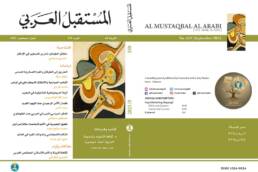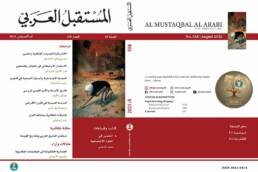المصادر:
(*)نُشرت هذه الدراسة في مجلة إضافات العددان 33-34.
(**) كلاوديو كوستا بينهيرو: رئيس برنامج سيفيس (Sephis).
(***) منير السعيداني: أستاذ علم الاجتماع، كلية الآداب والعلوم الإنسانية، جامعة تونس المنار.
Agnew, John A. (1989). Power of Place: Bringing Together Geographical and Sociological Imaginations. Boston, MA: Unwin Hyman.
Amuzegar, Jahangir (1976). «The North-South Dialogue: From Conflict to Compromise.» Foreign Affairs: vol. 54, no. 3 April.
Appadurai, Arjun. (1996). Modernity at Large: Cultural Dimensions of Globalization. Minnesota, MN: University of Minnesota Press.
Appadurai, Arjun (2000). Globalization and Area Studies: The Future of a False Opposition. Amsterdam: Centre for Asian Studies Amsterdam.
Arndt, H. W. (1981). «Economic Development: A Semantic History.» Economic Development and Cultural Change: vol. 29, no. 3, April, pp. 457‑466.
Arrigui, Giovanni. (1990). «The Developmentalist Illusion: A Reconceptualization of the Semiperiphery.» in: William G. Martin (ed.). Semi-Peripheral States in World Economy. Westport, CT: Greenwood Press.
Burman, B. K. Roy (1982). «Commission on Futurology.» Current Anthropology: vol. 23, no. 4, August, pp. 469‑470
Burman, B. K. Roy. (1984). «Commission on Futurology.» Current Anthropology: vol. 26, no. 2, April, pp. 301‑302.
Chakrabarty, Dipesh (2000). Provincializing Europe. Postcolonial Thought and Historical Difference. Delhi; Oxford University Press.
Chatterjee, Partha (1997). Our Modernity. Amsterdam: Sephis.
Chatterjee, Partha (2005). «Empire and Nation Revisited: 50 Years after Bandung.» Inter-Asia Cultural Studies: vol. 6, no. 44, pp. 487‑496.
Clark, Colin (1940). The Conditions of Economic Progress. London: Macmillan Publishing.
Clifford, James (1997). Routes: Travel and Translation in the Late Twentieth Century. Cambridge, MA: Harvard University Press.
Conceição Tavares, Maria (2010). «Não tem mais centro e periferia.» Entrevista a Folha de São Paulo: 12/9.
Eisenstad, Shmuel N. «Multiple Modernities.» Daedalus: vol. 139, no. 1, Winter, pp. 1‑29.
Friedman, Jonathan (2000). «Globalization, Class and Culture in Global Systems.» Journal of World-Systems Research: vol. 6, no. 3, pp. 636‑656.
Friedman, Jonathan (2001). «Globalization, Dis-Integration, Reorganization, the Transformations of Violence.» in: Jonathan Friedman (ed.). Globalization, the State, and Violence. Lanham, MD: AltaMira Press.
Gregory, Derek (1994). Geographical Imaginations. Oxford: Blackwell.
Gruzinski, Serge (1988). La Colonisation de l’Imaginaire: Sociétés indigènes et occidentalisation dans le Mexique espagnol, XVIème-XVIIIème siècle. Paris: Gallimard.
Hannerz, Ulf (1989). «Notes on the Global Ecumene.» Public Culture: vol. 1, no. 2, Spring, pp. 66‑75.
Henshel, R. (1982). «Sociology and Social Forecasting.» Annual Review of Sociology: vol. 8, pp. 57‑79.
Horowitz, Irving Louis (1974‑1975). «Sociology and Futurology: The Contemporary Pursuit of the Millennium.» Berkeley Journal of Sociology: vol. 19, pp. 37‑53.
Johnson, David and Kenyon, Peter (1993). «Forecasting and Futurology.» Australian Economic Review: vol. 26, no. 2, April, pp. 4‑18.
Johnson, Donald S. (1998). Phantom Islands of the Atlantic: The Legends of Seven Lands That Never Were. New York: Avon Books.
Kaiwar, Vasant and Sucheta Mazumdar (2003). Antinomies of Modernity: Essays on Race, Orient, Nation. Durham: Duke University Press.
Koselleck, Reinhart (2006). «Espaço de experiência e horizonte de expectativas.» in: Futuro passado-contribuição à semântica dos tempos históricos. Rio de Janeiro: Contraponto, pp. 311‑337 [original: 1979].
Manguel, Alberto and Gianni Guadalupi (2000). Dictionary of Imaginary Places. Mariner Books.
Marshall, Alfred (1890). Principles of Economics. London: Macmillan and Co., Ltd.
Merton, Robert K. (1948). «The Self-Fulfilling Prophecy.» The Antioch Review: vol. 8, no. 2, Summer, pp. 193‑210.
Mudimbe, Valentin Y. (1988). The Invention of Africa. Bloomington, IN: Indiana University Press.
O’Neill, Jim (2001). Building Better Global Economic BRICs. London: Goldman Sachs. (Global Economics, paper; no. 66)
O’Neill, Jim (2011). The Growth Map: Economic Opportunity in the BRICs and Beyond. London: Portfolio Penguin.
O’Neill, Jim (2013). The BRIC Road to Growth. London: Publishing Partnership.
Ong, Aihwa (1999). Flexible Citizenship: The Cultural Logics of Transnationality. Durham, NC: Duke University Press.
Parmar, Inderjeet (2012). Foundations of the American Century: The Ford, Carnegie, and Rockefeller Foundations in the Rise of American Power. New York: Columbia University Press.
Ramaswamy, Sumathi (2001). The Lost Land of Lemuria: Fabulous Geographies, Catastrophic Histories. Berekeley, CA: University of California Press.
Randeria, Shalini (2002). Entangled Histories of Uneven Modernities: Civil Society, Caste Solidarities and Legal Pluralism in Post-colonial India. Chicago, IL: University of Chicago Press.
Rist, Gilbert (2009). The History of Development: From Western Origins to Global Faith. London: ZED.
Said, Edward (1978). Orientalism. London: Penguin.
Schumpeter, Joseph A. (1934 [1911]). Theory of Economic Development. Translated by Redvers Opie. Cambridge, MA: Harvard University Press. (Harvard Economic Studies; vol. 46)
Slocum, Karla and Deborah A. Thomas (2003). «Rethinking Global and Area Studies: Insights from Caribbeanist Anthropology.» American Anthropologist: vol. 105, no. 3, September, pp. 553‑565.
Smith, Adam (1776). An Inquiry into the Nature and Causes of the Wealth of Nations. London: Methuen and Co., Ltd.
Stagl, Justin (1995). History of Curiosity: Theory of Travel, 1550‑1800. Chur: Harwood Academic Publishers.
Subrahmanyam, Sanjay (1997). «Connected Histories. Notes towards a Reconfiguration of Early Modern Eurasia.» Modern Asian Studies: vol. 31, no. 3, pp. 735‑762.
Subrahmanyam, Sanjay (2005). Explorations in Connected Histories. New Delhi; Oxford: Oxford University Press.
Tsing, Anna (2000). «The Global Situation.» Cultural Anthropology: vol. l5, no. 3, pp. 327‑360.
Van Agtmael, Antoine (2007). The Emerging Markets Century: How a New Breed of World-Class Companies Is Overtaking the World. New York: Free Press.
Van Schendel, Willem (2002). «Geographies of Knowing, Geographies of Ignorance: Jumping Scale in Southeast Asia.» Environment and Planning D: Society and Space: vol. 20, pp. 647‑668.
Vogel, Ezra F. (1991). The Four Little Dragons: The Spread of Industrialization in East Asia. Cambridge, MA: Harvard University Press. (Edwin O. Reischauer Lectures; Book 3)
[1] تحيل عبارات «تخيل الأمكنة» و«ابتداع الأمكنة» إلى جدل ترسّخ في الأجندات الدولية قارب العلوم الاجتماعية والجغرافيا. انظر: (Agnew, 1989; Gregory, 1994).
[2] في استجوابين حديثين زعم عالم الإناسة الفرنسي الشهير جورج بالانديي أنه أوحى بالمفهوم لـ «ألفراد سوفي» الذي قد يكون استخدمه من دون أن يعترف لبلانديي بأنه هو من صنعه.
[3] أشكر لينا لافيناس (Lena Lavinas) لاقتراحها هذا اللفظ خلال المناقشات التي خضناها في منتدى الجمعية الوطنية للخريجين والباحثين في العلوم الاجتماعية – البريكس (Anpocs-Brics forum). استخدم اللفظ الفرنسي bricolage (= «ترميق») إذ يسمح لي مقروناً إلى اللفظ المركب بريكس بالتلاعب بالألفاظ (يُنطق اللفظ الفرنسي bricolage في مقطعه الصوتي الأول بنفس الطريقة التي تنطق بها الأحرف الأربعة الأولى المكونة للفظ المركب الذي يدل على اسم بلدان البريكس)، وهو يحيل على العمل اليدوي البسيط غير المحترف مما يمكن التدليل عليه بالإنكليزية من طريق التعبير المركب «من صنع يديك» (DIY (do-it-yourself)).
[4] انبثقت إحدى أهم تجارب المستقبليات المعروفة مما له علاقة بالاقتصاد عن مبادرة نادي روما (Rist, 2008: 159sqq) ، وهي مجموعة تفكير دولية تتكون من رؤساء دول قدامى وبيروقراطيين وأكاديميين يقدمون أنفسهم على أنه مهتمون بمستقبل العالم الاقتصادي وقضاياه السياسية. تكون النادي سنة 1968 في أكاديمية لينسا بروما ولكن مقره الآن يقع في وينترثور في مقاطعة زوريخ بسويسرا (المترجم).
[5] الحداثة الأوروبية مأخوذة على أنها عولمةٌ منظور إيبيستيمي مخصوص على ما سبق ونقده كل من: (Chatterjee, 1997; Eisesntadt, 2000; Chakrabarty, 2000; Randeria, 2002).
[6] التنمية الغربية التي تؤخذ أحياناً على أنها مرادف للازدهار والتقدم المادي (Smith, 1776)، وأحياناً على أنها تنمية اقتصادية (Schumpeter, 1911) أو تقدم اقتصادي (Clark, 1940) أو حتى على أنها تصنيع (Marshall, 1890 and Arrigui, 1990).
[7] «أدّى المزيج المشوش حيال المجال إلى انقسام مُؤَسّسِيٍّ للجماعات الأكاديمية على امتداد العالم، تلك التي تدربت في انفصال بعضها عن بعض وصارت منخرطة في خطابات ومجادلات مخصوصة المجال، كما كوّنت دوائر مرجعية راسخة التأسيس وطوّرت آليات وطقوساً مماثلة لحفظ الانضباط داخل حدودها الفكرية» (Van Schendel, 2002: 648).
بدعمكم نستمر
إدعم مركز دراسات الوحدة العربية
ينتظر المركز من أصدقائه وقرائه ومحبِّيه في هذه المرحلة الوقوف إلى جانبه من خلال طلب منشوراته وتسديد ثمنها بالعملة الصعبة نقداً، أو حتى تقديم بعض التبرعات النقدية لتعزيز قدرته على الصمود والاستمرار في مسيرته العلمية والبحثية المستقلة والموضوعية والملتزمة بقضايا الأرض والإنسان في مختلف أرجاء الوطن العربي.



